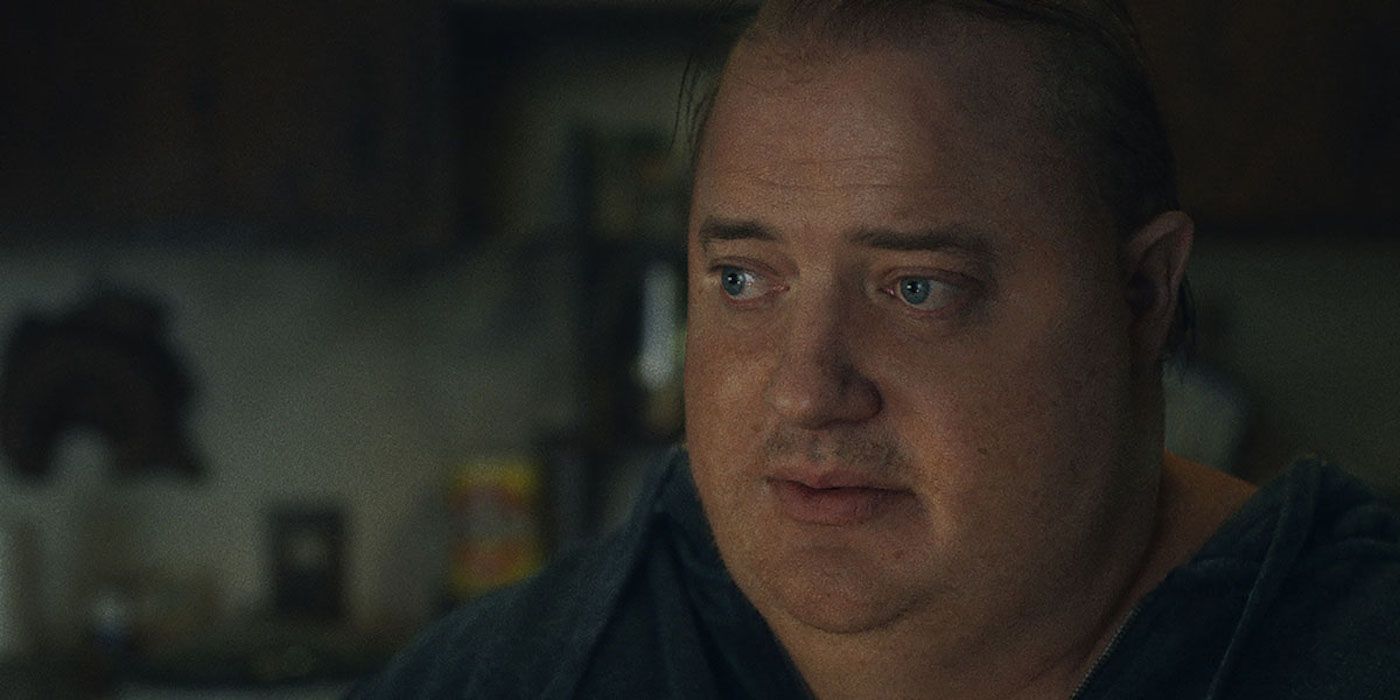The Whale is being recognized for Brendan Fraser’s tremendous performance. And the actor, whose career was paused for a long while, deserves the accolades he is receiving for his turn as Charlie. Director Darren Aronofsky’s latest feature, from a screenplay by Samuel D. Hunter, is powerful because of Fraser’s central performance. It’s the key to the movie’s success. While the film is determined to live in the pain felt and lobbed at its main character, there are moments of gentle vulnerability and contemplation in its exploration of guilt, redemption, grief, and trauma.
Charlie (Fraser) is a 600-pound English professor who is suffering from congestive heart failure. He lives alone and is primarily immobile, though he is visited often by his friend Liv (Hong Chau), who is also a nurse, and, frustratingly, by an annoyingly persistent missionary, Thomas (Ty Simpkins), who is trying to save Charlie. When Charlie is seized by pain, he reads from an essay about Moby-Dick to make him calm down and feel better. Knowing that he is reaching the end of his life, however, Charlie reaches out to his estranged daughter, Ellie (Sadie Sink), in the hopes of mending their relationship before he dies.
Fraser’s performance is magnetic and nuanced. He imbues Charlie with so much optimism, kindness, and empathy. Whereas most of the characters, save for Liz, are pretty terrible and cruel, Charlie is not. The film acknowledges that he has been through a lot in his life. He lost the love of his life, he wasn’t able to be there for his daughter in the way he wanted to, and so on. Despite all the hardships, Charlie’s regrets and sadness don’t overcome his need to find pockets of light in an otherwise tragic situation. The Whale portrays Charlie through an empathetic lens. The story explores his character enough to understand him and his journey, from where he was to where his life ultimately led him. Other characters offer their sympathy and want to help, but it’s an instance where they themselves are lost and lashing out at someone who seems like an easy enough target. Charlie, however he is feeling, doesn’t take the bait most of the time.
The Whale is a poignant tale of grief, regret, and redemption. It sees Charlie looking back on his life — the joys and the missteps along the way — as death nears, but it also contemplates religion, sexuality, and parenthood. The film is bolstered by a riveting performance by Brendan Fraser, who portrays Charlie’s every emotion with sincerity and sensitivity. His performance is grounded and honest, beautiful in the way the actor deepens and humanizes Charlie. Without Fraser, The Whale wouldn’t be what it is, especially as aspects of the script are surface-level at best and unnecessarily melodramatic at worst. Still, Charlie’s journey, his desire to love and be loved, evokes a tender, compassionate emotional reaction. After all that he’s been through, the traumas he’s experienced, and shortcomings as a father, Charlie wants only to look upon the world and his life with bright, hopeful eyes and see the beauty in it. What Fraser manages to pull off in his performance is lovely, and it’s one of the strongest, most heartening aspects of the film.
Aronofsky’s film is not without its pitfalls. There’s a lot of verbal abuse thrown at Charlie, and daughter Ellie is especially abhorrent in her treatment of him. The cruelty in some of the characters’ actions and words can get excessive, making for a painful watch at times. This is especially true when Aronofsky’s direction showcases Charlie in a horrific light, one that is meant to disgust viewers instead of reaching for the empathy that is offered in other scenes. It’s as though the filmmakers wanted to subject Charlie to the worst of the worst before the film’s ending, and it’s this seeming desire to cause unending pain for the lead that might turn viewers off.
While The Whale is never dull, its over-the-top theatrical staging turns certain elements of the script into an aggressive melodrama that doesn’t always work. Character dialogue — save for Hong Chau as Liz, who brings equal parts heart and frustration to her role — reaches for excess in parts when thoughtful consideration would have sufficed. The Whale is nonetheless memorable, if one is able to sit through Charlie’s pain, because of its handling of regret, guilt, and grief. Though it often offers surface-level readings about religion and father-daughter relationships, in particular, the film is worth the watch for Fraser’s performance alone.
The Whale had its premiere at the 2022 Toronto International Film Festival on September 11. The film releases in theaters on December 9. It is 117 minutes long and is not yet rated.


